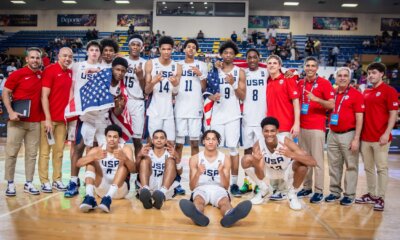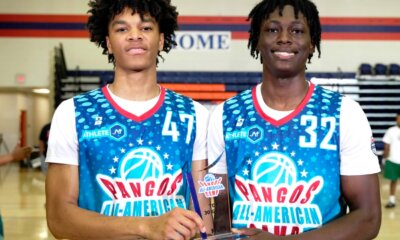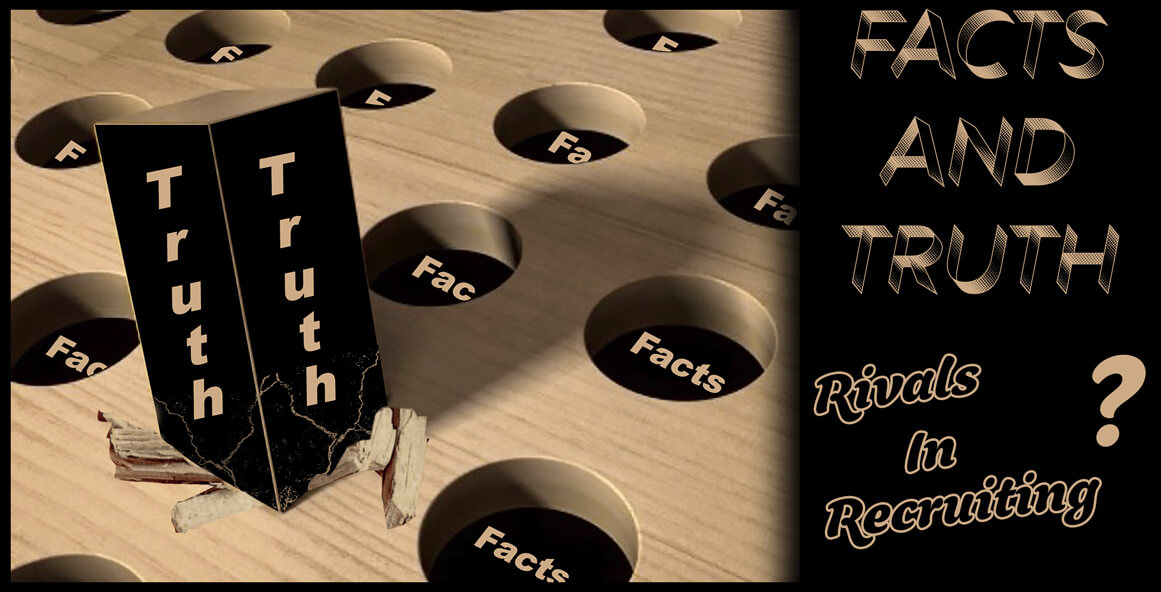
It amazes me that no matter how advanced the players become, how completive the recruiting process gets or how organized nearly every aspect of club basketball becomes, we still have long running issues that just seem to never go away. Seriously, we’ve now got TV and on line video coverage, we’ve got national recruiting services on the road year round, there are wall to wall college recruiters in every gym during NCAA evaluation periods but having available, complete and accurate rosters still seems to be the Mount Everest of challenges.
Recently I attended one the longest running and highest profile tournaments held on Memorial Day weekend. Despite having first class and convenient facilities, a deep and talented pool of teams, games that ran on time and three man college level officiating crews, rosters were virtually non-existent. I say virtually because I got 16 pages that represented less than 20 teams out of the 149 registered for the event. To say that it was disappointing would be an understatement. There were plenty of players on hand I knew and had seen previously but I also have notes on over 75 players that I have no clue as to who they are. Oh, I know the team and can track down the information eventually but during an event where I need to be watching games and not chasing information it was frustrating to say the least.
It would be simple to shrug it off and say it’s a non-recruiting period for Division I coaches thus, no need for rosters. However, then you would be ignoring the fact that every major media and scouting entity was courtside with no hands on information to work with. Of course Blue Star Media and Blue Star Report (Amy Wright and yours truly) were there as was All Star Girls Report (Bret McCormick), Colligate Girls Basketball Report (Dan Olson) as well as Peach State/Jump Off Plus (Brandon Clay, Keil Mooreand Jonathan Hemingway). There were also numerous non D-I college recruiters courtside as well wondering just who was who out on the floor.
The challenging part of evaluating without rosters isn’t the missing address, high school, e-mail or phone number. We don’t even need a player’s height or position since more often than not those elements are almost as truthful as some of the campaign ads emanating from the Romney and Obama camps. The bare basics are usually enough. Accurate name and number as well as the year of graduation will serve the purpose. Sure, we would love to have it all but name, number and year are essential. Assessing a player’s potential when they’ve got three more years of high school is an entirely different perspective than if she’s entering her senior season. By the way, always list their class as the actual chronological year (2013, 2014, etc..). The freshman, sophomore, junior thing always leaves room to question if they mean last year or next year. One time a coach who I made that suggestion to provided me with an updated list showing 9th, 10th and 11th grade instead. Good intentions but I believe he missed the point on that one.
It’s not hard to ask a coach after a game about their players and it’s something all of us (evaluators, media and recruiters) frequently do. However, if you’re at an event for a limited amount of time, it’s not efficient to be having those conversations following every single game. There are more games tipping off as soon as one set comes to an end and odds are most club coaches will want to tell you about the player(s) you’re asking about as well as others on their roster or in their club. Again, there’s nothing wrong with that, but it’s difficult when you’re supposed to be on another court at the same time. Additionally it’s important to keep in mind that during the July recruiting periods Division I staff members are not permitted to talk with club coaches in person or on the phone at all.
Rather than point fingers or assign blame let’s take a look at roster responsibility. Everyone has a hand in making sure than each time a team participates accurate information is available to anyone in the gym. Some individuals carry more accountability than others but if it’s a priority to all, no team or player is going to be overlooked if they catch someone’s eye.
Players – The responsibility the athlete carries is simple. Stick with one number and keep pestering your parents and coaches to make sure rosters are submitted well in advance of every event. Number changes are rare but can be a problem. Coaches talk like gossiping grandmothers and if they’re checking out #32 because a colleague steered them that way; #32 doesn’t need to be wearing #14. Also, folks who see a team multiple times may have a thought or two in the back of their head about a player but if they see them again and want to take a closer look and can’t find them at a glance…they may look elsewhere. Sentimental attachments to a number are nice, but get attached to a single number and wear it each time out. Oh yeah, tying the shoulder straps of your jersey together or tucking them under the shoulder straps of your sports bra sometimes makes the name or number tough to read. Just a tip.
Parents – In theory there’s not much parents can do but this is one area where you want to protect your investment and your daughter’s time. Be sure your coach has prepared and submitted an accurate roster well in advance to every event on the schedule. If you really want to step up, offer to fill out the forms or create a roster to be sent in. I wrote in a previous column that one parent should carry an up to date roster on a flash drive to every event and provide information to event operators or printed copies to coaches, evaluators or media should it be needed. It’s not difficult to add or delete players and change personal information if someone will take the responsibility to do it.
Club Coaches / Directors – While there may be a lot on your plate, ultimately it’s your responsibility to make sure that all roster information is provided to every event in a timely fashion. Do it for every competition (certified or not) since, as evidenced by the Memorial Day tournament I referenced, there is no such thing as a non-recruiting event in today’s environment. Confirm that the event is providing rosters to those individuals. If they’re not, encourage them to do so and if they still won’t, have copies of yours printed to hand out as needed. If they are making them available and you’re truly serving your players you’ll double check to see that it’s been received and included. Don’t assume just because you sent it that it made its way into the pack provided to recruiters, evaluators and media. Always include all of your own contact information on the rosters as well. Folks may not have time to talk with you in the gym but you always want to be available should someone be looking for insight and information. If you find out that college coaches, evaluators and media were on hand and didn’t receive rosters you need to take issue with the tournament director or look for another event next time around. You, your players and parents got shortchanged.
Event Operators – If anyone ultimately carries the burden of providing rosters it’s the folks who run a tournament. Let’s face it, we’re not talking about astrophysics or brain surgery. It shouldn’t be that difficult. It amazes me anytime that rosters aren’t available when you consider how efficient and thorough other tournaments are these days. The other event I attended Memorial Day weekend (USJN – Toledo) had accurate, printed and bound rosters for 90 teams available the moment I walked in the door. If the players themselves aren’t reason enough for you, let greed rule the day. Most coaches expect to pay for rosters and even a minimal amount for a set can add up and make the effort more than worth your while financially. In the end it should be your commitment to your participants (teams, players and parents) that motivates you to make sure they get all they can out of every event and that includes making sure nobody leaves the gym wondering who a point guard is or how old a post player happens to be.
It’s not Breanna Stewart, Diamond DeShields or Kelsey Mitchell who will be impacted by incomplete, inaccurate or non-existent rosters. When folks see them in action they’re going to track down just who they are, when they graduate and their shoe size if it’s available. It’s the not quite so dynamic athlete or the young player who has that moment or two that makes you look. It’s the kid that keeps you watching just a little longer or makes sure that you find the time to catch their team in action once more. It’s the kid who isn’t 6-5, can’t hang on the rim or qualify for the 100 meters in London this summer. It’s the one who has just average size, sound athleticism and yet still makes plays at both ends of the floor through effort, skills and court intelligence. They’re the ones who might not get the interest, evaluation or coverage if the information isn’t available.
No matter what the level, Division I, II, III, NAIA or JC, not one coach should ever leave a gym wondering who an athlete was or what year she graduates. The roster problem isn’t the nightmare that it used to be but it’s still an issue every club ball season and in the end it’s the players who wind up on the short end of things. If they do enough on the floor to make someone “look them up” they deserve for the information to be there.
Mark Lewis is a national evaluator and photographer for Blue Star Basketball as well as the lead columnist for Blue Star Media. Twice ranked as one of the top 25 Division I assistant coaches in the game by the Women's Basketball Coaches Association (WBCA), he logged 25 years of college coaching experience at Memphis State, Cincinnati, Arizona State, Western Kentucky and Washington State. Lewis serves as a member of the prestigious McDonald’s All-American selection committee as well as the Naismith College Player and Coach of the Year committees.

Latest Articles
-


Christopher Lawlor
/ 2 days agoNBPA Top 100 Camp moves venue but the top-notch talent, coaching still shines in South Carolina
ROCK HILL, S.C. — The National Basketball Players Association tipped off its annual elite...
-


Christopher Lawlor
/ 5 days agoUSA defeat Canada in FIBA U16 AmeriCup Final to lift the trophy for ninth time with a perfect mark; Nasir Anderson earns Most Valuable Player
CIUDAD JUAREZ, Mexico – The FIBA U16 AmeriCup 2025 throne has the United States’...
-
Christopher Lawlor
/ 1 week agoSPEARHEADED: Americans crush Brazil by 79 points at FIBA U16 AmeriCup quarterfinals; Marcus Spears Jr. puts up 16 points and 9 rebounds
JUAREZ, Mexico — The USA men passed its first test in the knockout stage...
-


Christopher Lawlor
/ 1 week agoSTARS SHINE: Bailey, Costello earn Co-MVPs at 23rd Pangos All-American Camp in Las Vegas; three Santa Margarita (CA) players recognized
LAS VEGAS – The Pangos All-American Camp did not disappoint. For three days the...




